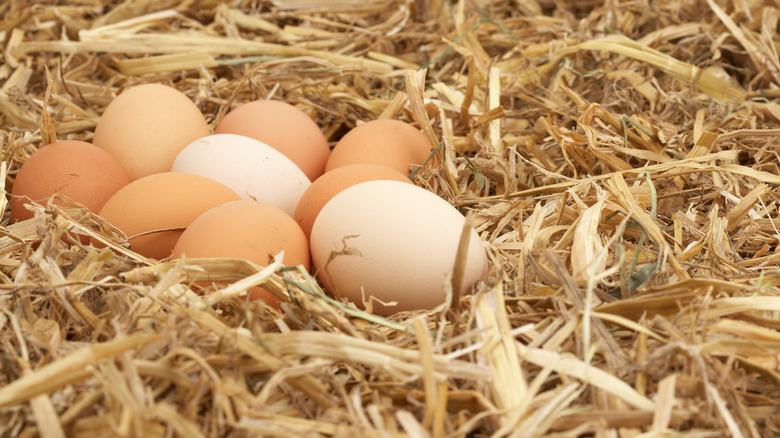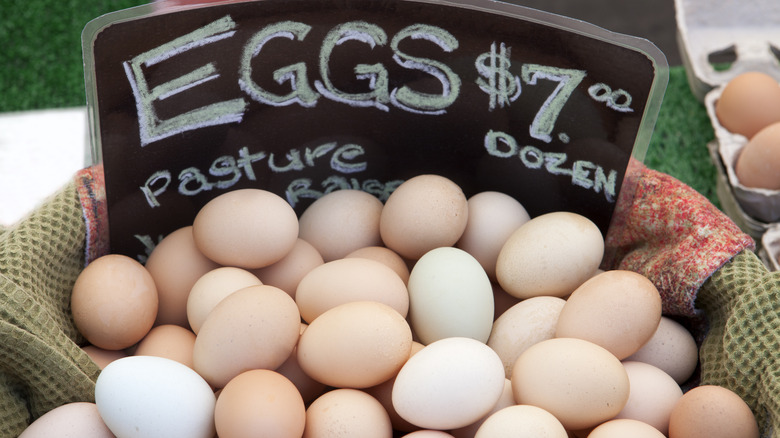Do Farm Fresh Eggs Really Taste Better Than Store Bought?
A long time ago, I lived on a farm. Well, a farm may be too flattering a term since it was just 40 acres of prickly pear and dried cow poop. Because there was nothing whatsoever to do in the tiny town 10 miles away, I took to attending the weekly livestock auction and developed the unfortunate habit of buying way too many chickens. Long before city chickens became trendy (the kind people raised during the pandemic and abandoned shortly afterward, not the pork-based Rust Belt delicacy), I was completely over them, because I can tell you for a fact: Eggs straight from a chicken's butt don't taste any different than the kind you buy in the supermarket. American Egg Board food safety manager Elisa Maloberti seems to agree. At any rate, she supplied several reasons why "farm fresh" isn't as big a deal as you might think.
"You might notice differences in shell color, yolk color, or cleanliness between eggs from a farm stand and those from the grocery store," Maloberti told The Takeout. "These differences are typically due to the hen's breed, diet, and egg handling; not necessarily an indication of nutrient value, freshness, or quality." She also said the flavor may vary slightly, but this is due more to the hen's diet and how the eggs are cooked. In her opinion, eggs bought directly from a farmer aren't necessarily superior to those purchased at a grocery store. While acknowledging that personal preferences vary, her feeling is: "There's no inherent flavor advantage to one type over another."
Farm fresh doesn't really mean much
Restaurant menus love to throw around the term 'farm fresh' whenever eggs are mentioned, but it's not just us disgruntled ex-chicken keepers that roll an eyeball when they do. Where else would an egg be from, if not a farm? It's not like Kroger has backroom chicken coops. As Maloberti pointed out, "All eggs are natural and farm-fresh, with no additives or preservatives."
As for the fresh part, Maloberti informed us that supermarket eggs, once they're washed, are sent straight to the store and typically arrive within 48 to 72 hours of exiting the chicken. As long as they're kept refrigerated, they'll last several weeks. (Yes, eggs do need to be refrigerated if purchased in the United States since American hens aren't vaccinated against the salmonella virus.) She also noted, "Since 'farm fresh' isn't a regulated USDA label, the term can mean different things."
With or without the "farm-fresh" label, Maloberti assured us of a baseline level of quality. "No matter where the egg comes from, its core nutrients, like high-quality protein and essential vitamins, remain the same unless the eggs are nutritionally enhanced." As she pointed out, "All eggs are a nutritious, high-quality choice."
Egg production has little impact on flavor
If your primary concern is flavor, not only does it not matter where you buy your eggs, but it also makes little difference how the chickens are raised. If you're paying extra for eggs labeled "cage-free," "organic," or"pasture-raised," it may simply be a sop to your conscience; since yes, it's pretty horrible to think of how factory-farm chickens live. (And this coming from someone who laughed her butt off when her malamute killed one of her chickens and wore it as a hat.) Still, it's no guarantee those eggs will taste any better.
According to Maloberti, "Any subtle flavor differences usually come from the hen's diet, not the housing type." While she admits that organic and pasture-raised hens may have slightly different diets that may, in turn, influence the flavor, she says this won't necessarily be the case.
In Maloberti's eggs-pert opinion (mandatory egg pun; check), there really aren't any low-quality eggs. As she put it, "Regardless of production style — conventional, cage-free, organic, or pasture-raised — egg farmers are committed to hen care and providing the variety of eggs that consumers want."


